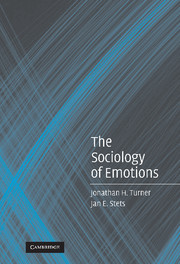Book contents
- Frontmatter
- Contents
- Tables and Figures
- Acknowledgment
- Foreword by Lynn Smith-Lovin
- 1 Conceptualizing Emotions Sociologically
- 2 Dramaturgical and Cultural Theorizing on Emotions
- 3 Ritual Theorizing on Emotions
- 4 Symbolic Interactionist Theorizing on Emotions
- 5 Symbolic Interactionist Theorizing on Emotions with Psychoanalytic Elements
- 6 Exchange Theorizing on Emotions
- 7 Structural Theorizing on Emotions
- 8 Evolutionary Theorizing on Emotions
- 9 Prospects for the Sociology of Emotions
- References
- Index
5 - Symbolic Interactionist Theorizing on Emotions with Psychoanalytic Elements
Published online by Cambridge University Press: 05 June 2012
- Frontmatter
- Contents
- Tables and Figures
- Acknowledgment
- Foreword by Lynn Smith-Lovin
- 1 Conceptualizing Emotions Sociologically
- 2 Dramaturgical and Cultural Theorizing on Emotions
- 3 Ritual Theorizing on Emotions
- 4 Symbolic Interactionist Theorizing on Emotions
- 5 Symbolic Interactionist Theorizing on Emotions with Psychoanalytic Elements
- 6 Exchange Theorizing on Emotions
- 7 Structural Theorizing on Emotions
- 8 Evolutionary Theorizing on Emotions
- 9 Prospects for the Sociology of Emotions
- References
- Index
Summary
SIGMUND FREUD'S CONTRIBUTION TO SOCIOLOGICAL THEORIES OF EMOTIONS
We associate Sigmund Freud's ideas with images of people hiding deep and dark secrets revolving around the repression of sexual desires. Although this imagery is not completely wrong, it misses the potentially useful contributions of psychoanalytic approaches to sociological theorizing. If we recast somewhat Freud's ideas in a more sociological guise, we can immediately see his relevance to sociological theories of emotion. Freud emphasized that interactions can become emotionally charged, often below polite surface demeanor, as a result of (1) negative responses of others to a person's behavior and (2) activation of defense mechanisms by this person to protect self from the pain of these negative responses.
Let us begin with Freud's most famous concepts – id, ego, and superego – and examine what he meant by these terms from a more sociological perspective. At the outset, we should emphasize that Freud did not see the id, ego, and superego as things, but as processes that organize a person's experiences and behaviors. Id is the concept that denotes the mobilization of the libido, or sexual drives, in the more inclusive sense of needs for not only sex, but also love, affection, and approval as well as more organic needs that all humans possess. Id is thus a set of processes in which an individual's need states begin to influence covert and overt behaviors. When id impulses are “consummated,” to use Mead's term, cathexis has occurred.
- Type
- Chapter
- Information
- The Sociology of Emotions , pp. 151 - 178Publisher: Cambridge University PressPrint publication year: 2005

